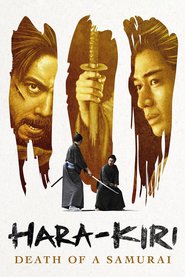Movielogr
Hara-Kiri: Death of a Samurai (2011)
Directed by Takashi Miike
Twitter Facebook Google+Most recently watched by sensoria
Overview
A tale of revenge, honor and disgrace, centering on a poverty-stricken samurai who discovers the fate of his ronin son-in-law, setting in motion a tense showdown of vengeance against the house of a feudal lord.
Rated NR | Length 128 minutes
Actors
Koji Yakusho | Ebizo Ichikawa | Eita | Hikari Mitsushima | Naoto Takenaka | Kazuki Namioka | Hirofumi Arai | Munetaka Aoki | Takashi Sasano | Gorō Daimon | Ayumu Saitô | Takehiro Hira | Baijaku Nakamura | Ippei Takahashi | Yoshihisa Amano
Viewing History (seen 2 times)
| Date Viewed | Device | Format | Source | Rating |
|---|---|---|---|---|
| 09/13/2020 | TV | Streaming | Video on Demand | 8 stars |
| 05/11/2018 | TV | DVD | Library | 6 stars |
| (Average) 7 stars |
Viewing Notes
Kinda amazing what a couple of years and a bad memory can do to my opinion of a film. After viewing a Mifune flick in the DKUTV samurai marathon I wanted to throw on another samurai flick b/c they tend to make me sleepy. Figured this one would do the trick when I fired it up at midnight. Quite the opposite as I got more engrossed in the story. Did not expect that to happen! So I turned it off around an hour into it and finished it up this evening.
I did not recall what I originally thought of the film but just checked before making these notes and whoa boy have I turned around on this movie. I guess it pays to give some space and time to certain films before a revisit. I was completely absorbed by this movie even as I was comparing it to the 1962 film in my head. This may be Miike’s most restrained film yet one where he pays great respect to the previous film. And that totally fits within the theme of the story, which was lost on me the first time around. I was looking for that Miike signature instead of admiring how he approached the material by making his take an embodiment of tragedies introduced in the storytelling.
From the framing and set design to the long pauses and lighting, I understand what he was aiming at in his version, a sense of contemplation throughout, and it’s all so good. And while I still believe that Ebizo Ichikawa cannot compare to Nakadai, who really makes that 1962 film a masterpiece, the emphasis that Miike places on the family is where this movie excels. It’s such a devastating segment that really hits hard when you realize this is being told by Ichikawa to the Lord of the House of Ii (Koji Yakusho). Not just a flashback. Ichikawa’s rage becomes palpable and powerful.

No comments yet. Log in and be the first!